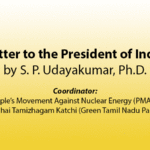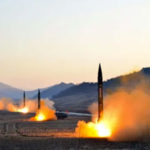Authored by Kelsey Davenport on June 14, 2019
U.S. Accuses Iran Prematurely of Violating Nuclear Deal
Tensions over the 2015 multilateral nuclear deal with Iran continue to rise after the Trump administrationaccused Tehran of violating one of its commitments under the agreement, but Iran’s decision to install additional advanced centrifuges appears to fall into a gray area not covered by the accord, known as the Joint Comprehensive Plan of Action (JCPOA). Despite the lack of clarity, the United States urged Iran to return to compliance even though U.S. President Donald Trump violated the deal by reimposing sanctions in May 2018 and Washington is no longer party to the agreement.
United States placard in IAEA Board of Governors plenary before the start of a meeting. (Photo: U.S. Mission, Vienna)The U.S. accusation, which was made during a meeting of the International Atomic Energy Agency’s (IAEA) Board of Governors June 11, centers around Iran’s installation of additional advanced IR-6 centrifuges. Officials from P4+1 countries party to the JCPOA have disputed the U.S. characterization that Iran is in noncompliance with its JCPOA obligations (see below for details).
Iran is still abiding by the JCPOA’s limits on heavy water and low-enriched uranium, according to the May 31 IAEA report, which is positive given that Iranian President Hassan Rouhani said May 8 that Tehran would no longer adhere to those limits. (see below for details).
The U.S. charge of Iranian noncompliance with the JCPOA comes days after U.S. Secretary of State Mike Pompeo said the United States is “prepared to engage in a conversation with no pre-conditions” with Iran. Pompeo’s June 2 comments followed remarks by Trump emphasizing that he is not seeking a military conflict or regime change with Iran. Trump, speaking in Japan May 27, said he is “not looking to hurt Iran at all” and that he thinks “we’ll make a deal.”
During his Japan trip, Trump also endorsed Japanese Prime Minister Shinzo Abe’s plan to visit Iran, raising speculation that Abe is serving as a mediator for the Trump administration (see below for details.) However, when Abe attempted to deliver a message from Trump to Supreme Leader Ayatollah Ali Khamenei June 13, Khamenei said that he does not view Trump as “deserving to exchange messages with” and will not respond.
Despite Trump’s outreach and what may be a softening on U.S. requirements for diplomatic engagement, he supported new sanctions targeting Iran’s petrochemical industry June 7 and threatened the “official end of Iran” after blaming Tehran for attacks on U.S. allies in the Middle East in May. The United States also accused Iran of attacking two oil tankers in the Gulf of Oman June 13 and held a UN Security Council meeting to discuss what the Trump administration characterized as a “clear threat to international peace and security.” (see below for details.)
Iran denied responsibility for the June 13 attack and accused the United States of “warmongering.” Iranian leaders have also rejected the Trump administration’s offer to engage in dialogue and questioned Trump’s sincerity. Iranian President Hassan Rouhani said June 1 that Tehran would support talks if the United States “sits respectfully at the negotiating table” but will not “submit to bullying.” The week before he reiterated that the United States must “lift the unjust sanctions and fulfill their commitments” to return to negotiations.
Khamenei was even more definitive in his rejection, saying May 29 that “we will not negotiate with America, because negotiation has no benefit and carries harm.” Khamenei also said June 13 that Trump’s claim that the United States is not interested in regime change “is a lie.”—KELSEY DAVENPORT, director for nonproliferation policy
Japanese Prime Minister Visits Iran with U.S. Message
Japanese Prime Minister Shinzo Abe visited Iran June 12-13, the first visit by a Japanese leader since 1978, amid speculation that he was acting as a mediator for U.S. President Donald Trump. When Trump was in Japan May 27, he expressed support for Abe’s visit to Iran and Abe said the United States and Japan should “collaborate closely” to prevent escalating tensions between Washington and Tehran.
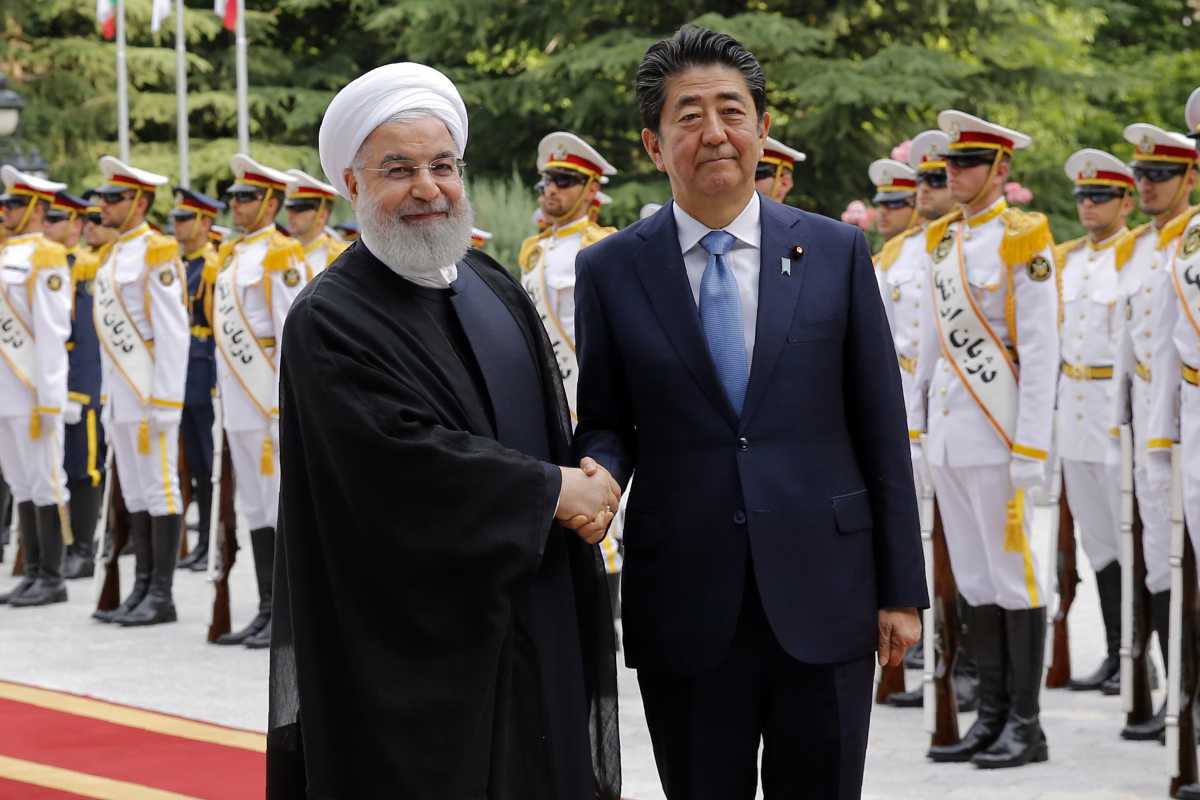
Iranian President Hassan Rouhani (L) welcomes Japanese Prime Minister Shinzo Abe, during a welcoming ceremony at the Saadabad Palace in the capital Tehran on June 12, 2019. (Photo:STRINGER/AFP/Getty Images)In a June 12 news conference with Iranian President Hassan Rouahni, Abe said that Japan will “use its utmost effort to reduce tension in the region” and said his country can play a “constructive role” in fostering peace and stability in the Middle East.
Abe said he expects Iran to “remain committed” to the nuclear deal and he expressed appreciation for the fatwa issued by Supreme Leader Ayatollah Ali Khamenei “that the use of atomic weapons is anti-sharia.”
Rouhani said that Iran welcomes the opportunity to improve ties with Japan and stated that Tokyo is interested in continuing to buy oil. Japan received a waiver from the Trump administration in November allowing Tokyo to buy limited amounts of oil from Iran without being subject to U.S. sanctions, but that waiver expired in May and was not renewed.
Abe also met with Iran’s Supreme Leader Ali Khamenei. Khamenei rejected Abe’s message from Trump and said he would not respond to it. He also reiterated during the meeting that Iran is opposed to nuclear weapons and to negotiations with Washington. He said that “we believe that our problems will not be solved by negotiating with the U.S.” and “what common sense would once again allow negotiations with a state that has thrown away everything that was agreed upon?”
Security Council Meets to Discuss Tanker Attack
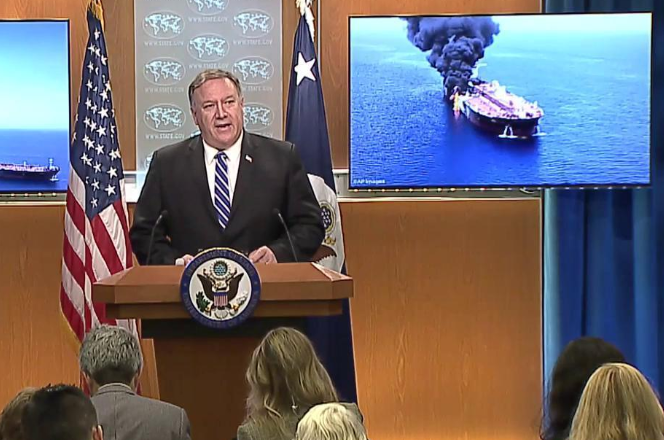
U.S. Secretary of Statement Mike Pompeo speaks to the press on the U.S. government’s assessment of Iranian responsibility for attacks on tankers in the Gulf of Oman, June 13, 2019 (Photo: U.S. State Department)The United States accused Iran of attacking two oil tankers in the Gulf of Oman June 13. U.S. Secretary of State Mike Pompeo said that “it is the assessment of the United States Government” that Iran conducted the attacks, “based on intelligence, the weapons used, the level of expertise needed to execute the operation, recent similar Iranian attacks on shipping.” The United States also released a video which it claims shows an Iranian boat removing an unexploded mine from one of the tankers.
Iranian government spokesman Ali Rabi deniedIran’s involvement and cautioned states against becoming “entrapped by deception of those who benefit from instability in the region.” Iranian Foreign Minister Javad Zarif also suggested that the attack was a false flag operation designed to implicate Iran and “sabotage diplomacy.” He said the decision to attack tankers bound for Japan during Prime Minister Shinzo Abe’s visit to Tehran (see above for details) was suspicious. Iranian ships in the region helped rescue crew members from the tankers.
The United States requested that the UN Security Council meet June 13 to discuss the attack. Acting U.S. Ambassador to the UN Jonathan Cohen told reporters after the Security Council meeting that “it is unacceptable for any party to attack commercial shipping” and that Iran is following through on its commitment to “interrupt the follow of oil” in the region. He said the United States plans to have “further conversations about [the attack] and how to respond in the days ahead.”
Iran’s mission to the UN issued a statement saying Tehran “categorically rejects the U.S. unfounded claim” that Iran was behind the attacks. Iran said that “the U.S. and its regional allies must stop warmongering and put an end to mischievous plots as well as false flag operations in the region.”
German Foreign Minister Discusses Sanctions During Iran Visit
German Foreign Minister Heiko Maas traveled to Tehran for meetings with Iranian President Hassan Rouhani and Foreign Minister Javad Zarif June 9. En route to Iran, he said that Germany would not negotiate a “less for less” agreement with Iran that accepts diminished compliance with the JCPOA. In a news conference with Zarif, Maas reiterated Europe’s commitment to finding solutions that provide Iran with economic benefits, but admitted that “we can’t perform miracles either.” Zarif said that Iran will continue to cooperate with efforts to preserve the JCPOA.View image on Twitter
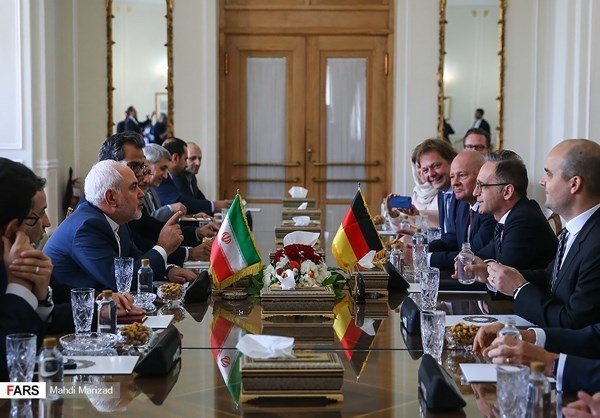

Frank talks with @HeikoMaas. Welcome German recognition that practical measures to ensure Iran’s economic dividends are essential to preserve #JCPOA.
We concurred that dialog among regional countries is crucial.
But @realDonaldTrump‘s “economic war” is THE cause of all tensions.1,34011:20 PM – Jun 10, 2019621 people are talking about thisTwitter Ads info and privacy
The head of INSTEX, the special payment channel set up to bypass U.S. sanctions to facilitate trade with Iran, traveled with Maas. INSTEX and its Iranian counterpart have yet to facilitate any trade, but Maas said Germany, France, and the UK continue to coordinate on the mechanism. The ambassadors to Iran from the three European countries issued a statement June 13 saying that the INSTEX delegation that traveled to Tehran for meetings “helped to advance” that mechanism. The statement said the countries are “committed to working with Iran to deliver INSTEX’s first transaction as quickly as possible.”
Foreign Ministry Spokesperson Abbas Mousavi said Iran has “not seen practical and tangible steps from the Europeans to guarantee Iran’s interests” and does not put much hope in INSTEX.
The United States has sent mixed messages about its tolerance for INSTEX. When U.S. Secretary of State Mike Pompeo met with Maas May 31, he reiterated that if INSTEX facilitates transactions for nonsanctioned trade, such as humanitarian goods, it would be “unproblematic.” However, Bloomberg reported June 10 that the Trump administration is considering sanctions on the Iranian counterpart for INSTEX, the Special Trade and Finance Institute, over its connection to the Central Bank of Iran, which is subject to sanctions.
Maas also visited several other countries in the region, and while in the United Arab Emirates he raised concerns about Iran’s ballistic missile program. Emirati Foreign Minister Abdullah bin Zayed Al Nahyan pressed for any further negotiations with Iran to include ballistic missiles. He also said that any future agreement “needs all the countries of the region to be a part of it.”
IR-6 Centrifuge Installation Disputed
In its May 31 report, the International Atomic Energy Agency (IAEA) noted that Iran has installed 33 IR-6 centrifuges, of which 10 are being tested with uranium, at Natanz. The increase in IR-6s is unsurprising, given that Iranian President Hassan Rouhani announced in April that Iran would install another 20 IR-6s machines, but it is unclear if the JCPOA and Iran’s confidential research and development plan submitted to the IAEA allows 33 IR-6 machines at this time. The IAEA said technical discussions regarding the IR-6 are ongoing.
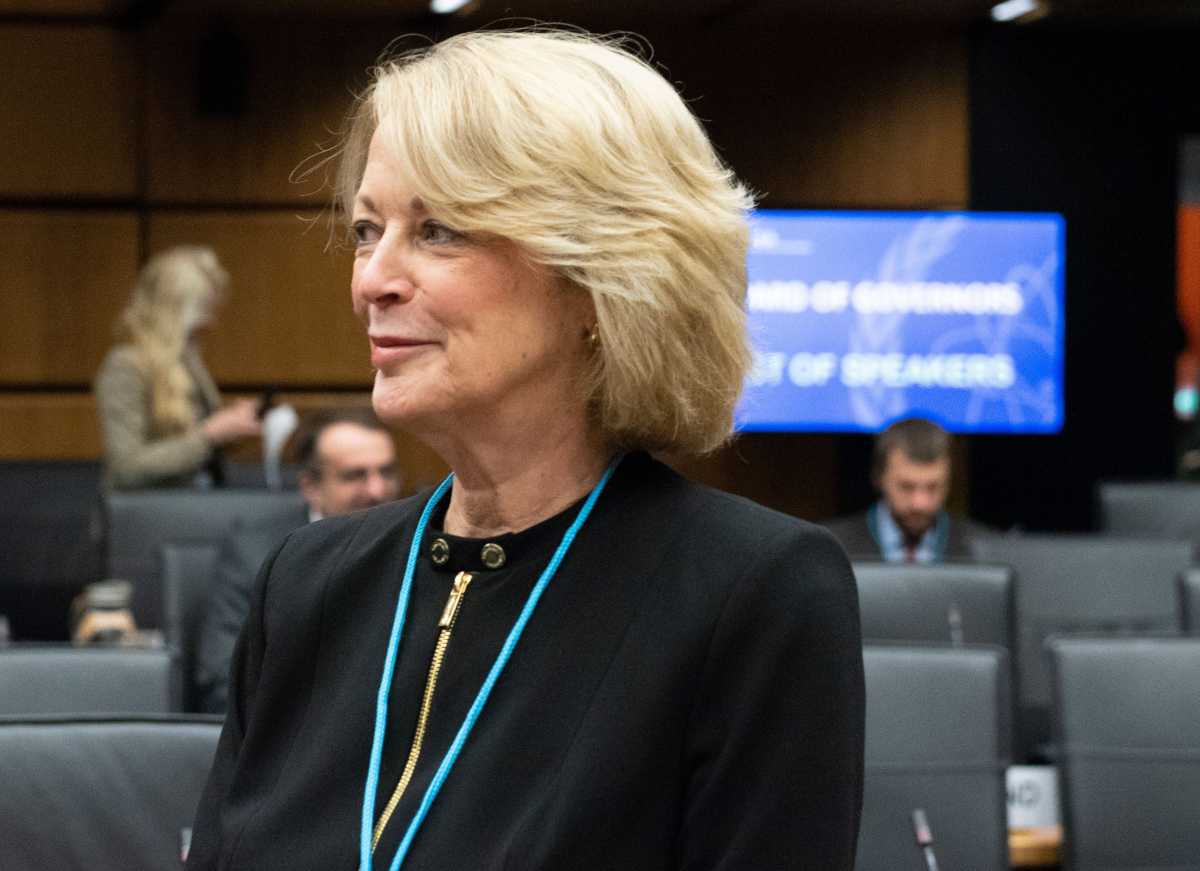
US representative to the International Atomic Energy Agency (IAEA), Jackie Wolcott at a meeting of IAEA Board of Governors in Vienna, November 22, 2018. (Photo:JOE KLAMAR /AFP/Getty Images)The IAEA report prompted the United States to accuse Tehran of violating the nuclear deal. U.S. Ambassador to the IAEA Jackie Wolcott told the agency’s Board of Governors June 11 that “Iran has claimed that it continues to comply with the JCPOA, but it is now reported to be in clear violation of the deal.” She said the IAEA’s decision to drop language that has appeared in prior reports—that Iran’s research and development activities are being conducted “within the limits defined by the JCPOA”—makes clear that Iran is “violating a key commitment related to centrifuge research and development.”
Other states disagree with the U.S. assessment. Russian President Vladimir Putin said June 6 that inspectors have not found “a single violation” of Iran’s nuclear commitments and Russia’s Ambassador to IAEA, Mikhail Ulyanov called the U.S. remarks “irresponsible” and said June 12 that Washington is using “blatant blackmail and intimidation” to “force other countries to curtail legitimate trade and economic ties with Iran.” European diplomats have described the question as a “gray area” that needs to be resolved.
According to the JCPOA, Tehran can conduct mechanical testing on two IR-6 machines and can test the IR-6 with uranium (but not withdraw any enriched material) using “single centrifuge machines and its intermediate cascades.” The deal does not specify what constitutes an “intermediate cascade,” but states that after eight and a half years (July 2024), Iran can “commence testing of up to 30 [IR-6] centrifuges machines.” (JCPOA, Annex I, Section G, Paragraph 38.) An alleged copy of Iran’s confidential research and development plan leaked to The Associated Press in 2016 suggests that Iran can move from testing a cascade of about 10 IR-6 machines to a cascade of 20 machines approximately halfway through the eight-and-a-half-year period after implementation day, around April 2020.
While the current testing of 10 IR-6 centrifuges with uranium appears consistent with the JCPOA and reporting on the leaked research and development plan, neither document appears to specify when Iran can install additional IR-6 machines. The Joint Commission, set up by the JCPOA to oversee implementation of the deal, appears to be discussing the question and is the appropriate body to clarify any ambiguity. Wolcott said the Joint Commission is “treating this issue with the seriousness it deserves.”
Given that the Joint Commission has yet to make a decision and that the United States has left the deal and no longer participates in that body, it was irresponsible of Wolcott to jump to conclude that the IR-6 installation is a violation of the JCPOA. At the same time, attempts by Iran to push the limits on interpreting the text of the nuclear deal are also unhelpful and risk further destabilizing the agreement.
Iran Remains Below Heavy Water and Uranium Limits, Despite Threats
The International Atomic Energy Agency’s (IAEA) most recent May 31 report on Iran’s implementation of the 2015 multilateral nuclear deal indicates that Tehran continues to adhere to the limits on heavy water and low-enriched uranium—a positive development after President Hassan Rouhani announced May 8 that Iran would no longer be bound by those caps. The report did, however, raise questions about Iran’s installation of advanced IR-6 centrifuges (see above for details.)
IAEA Director General Yukiya Amano expressed his concern June 10 about “increasing tensions over the Iranian nuclear issue.” He reiterated that implementation of Iran’s nuclear commitments is a “significant gain for verification” and said it is “essential” for Iran to continue to abide by the deal.
Specifically, the IAEA noted that Iran’s stockpile of uranium enriched to 3.67 percent uranium-235 was 174.1 kilograms as of May 20, a slight increase from the 163.8 kilograms recorded by the agency in February, but below the JCPOA’s limit of 202 kilograms (which corresponds to the quantity of uranium in 300 kilograms of 3.67 percent enriched uranium hexafluoride gas).
Iran could breach the LEU limit within weeks if Tehran decides to maximize the production capacity of the 5,060 IR-1 centrifuges allowed for enriching uranium under the JCPOA. Exceeding the limit of uranium enriched to 3.67 percent would reduce the so-called breakout time, or the time it takes Iran to produce enough fissile material for a nuclear weapon (currently around 12 months due to the nuclear deal).
However, slightly breaching the 300-kilogram limit would not be an immediate proliferation risk, as Iran would need roughly four times that amount of uranium hexafluoride gas enriched to 3.67 percent to produce enough weapons-grade material (more than 90 percent enriched uranium-235) for one bomb.
The IAEA report also noted that Iran is enriching uranium with no more than 5,060 IR-1 centrifuges and has not enriched uranium above 3.67 percent, as required by the deal. Iran has stated it will resume enrichment to higher levels around July 7 if the P4+1 do not come through with sanctions relief.
According to the IAEA report, Iran’s stockpile of heavy water was 125.2 metric tons as of May 26, below the 130 metric ton limit set by the deal. The stockpile is up slightly from the 124.8 metric tons reported by the IAEA in February.
Iran has the capacity to produce about five metric tons per quarter, but the IAEA noted that the heavy water production plant had been shut down from April 15-May 22. Iran also reported that it used two metric tons of heavy water since February for research activities overseen by the IAEA.
Given Iran’s heavy water production capacity, it is likely that Iran could breach the 130-metric-ton limit by the IAEA’s next report in late August. While any violation of the deal’s limits is a concern, excess heavy water does not pose a proliferation risk as it would be used to moderate Iran’s reactor at Arak, which remains unfinished. The IAEA reported that Iran has not resumed work at the Arak reactor.
The IAEA also noted that Iran continues to implement the additional protocol to its safeguards agreement and that inspectors have had access to all the sites and facilities in Iran they have needed to visit.
Members of Congress Seek Restrictions on Iran War Funding
Members of Congress are pushing to restrict the Trump administration’s ability to go to war with Iran. Representatives Ro Khanna (D-Calif.), Seth Moulton (D-Mass.), and Anthony Brown (D-Md.) offered an amendment to the National Defense Authorization Act (NDAA) for Fiscal Year 2020 stating that funds appropriated by the legislation cannot be used for military action against Iran unless Congress declares war or authorizes military force. An exception is also granted in the event of an attack upon the United States.
Khanna withdrew the amendment from the committee after it was debated June 13 but said he intended to introduce it on the floor. Chairman of the House Armed Services Committee Representative Adam Smith (D-Wash.) said he supported a floor vote on the issue and that he wants to “make clear in this NDAA that you have to follow the law and follow the Constitution before you go to war with Iran.”
Khanna co-authored an op-ed with Ambassador Thomas Pickering in The Hill June 12, arguing for the importance of Congressional restrictions, stating that the Trump administration’s Iran policy is “pushing the United States into a box, with few openings, increasing the risk of war.” Khanna and Pickering conclude that “when the administration is at great risk of provoking a conflict or miscalculating, it is critical that Congress do everything in its power to guard against another catastrophic confrontation, this time with Iran.”
Senator Tom Udall (D-N.M.), at a June 11 event at the Center for American Progress, said that “Congress must re-assert its war powers authority and make it crystal clear that this administration cannot go it alone in an armed conflict with Iran.” He also called for a prohibition on funding for military action against Iran without Congressional authorization. Udall introduced bipartisan legislation to that effect in April, which now has 25 co-sponsors.
These and other Iran deal-related questions will be on the agenda when U.S. Special Representative for Iran, Brian Hook, testifies before the House Committee on Foreign Affairs Subcommittee on Middle East, North Africa, and International Terrorism June 19.

